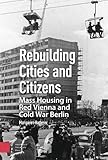Rebuilding Cities and Citizens : Mass Housing in Red Vienna and Cold War Berlin / Margaret Haderer.
Material type: TextPublisher: Amsterdam : Amsterdam University Press, [2023]Copyright date: ©2023Description: 1 online resource (196 p.)Content type:
TextPublisher: Amsterdam : Amsterdam University Press, [2023]Copyright date: ©2023Description: 1 online resource (196 p.)Content type: - 9789048552702
- Architektur
- Berlin
- City planning -- History -- 20th century -- Austria -- Vienna
- City planning -- History -- 20th century -- Germany -- Berlin
- Housing policy -- History -- 20th century -- Austria -- Vienna
- Housing policy -- History -- 20th century -- Germany -- Berlin
- Nachkriegszeit
- Public housing -- History -- 20th century -- Austria -- Vienna
- Public housing -- History -- 20th century -- Germany -- Berlin
- Wien
- Wohnungsbau
- Art and Material Culture
- Social and Political Sciences
- Sociology and Social History
- Urban Cultures
- ARCHITECTURE / History / Modern (late 19th Century to 1945)
- Urban and social history, political ideologies, public housing, the return of the housing question
- online - DeGruyter
| Item type | Current library | Call number | URL | Status | Notes | Barcode | |
|---|---|---|---|---|---|---|---|
 eBook
eBook
|
Biblioteca "Angelicum" Pont. Univ. S.Tommaso d'Aquino Nuvola online | online - DeGruyter (Browse shelf(Opens below)) | Online access | Not for loan (Accesso limitato) | Accesso per gli utenti autorizzati / Access for authorized users | (dgr)9789048552702 |
Browsing Biblioteca "Angelicum" Pont. Univ. S.Tommaso d'Aquino shelves, Shelving location: Nuvola online Close shelf browser (Hides shelf browser)
Frontmatter -- Table of Contents -- List of Illustrations -- Acknowledgements -- 1 Introduction: The Making and Remaking of Ideologies through Space -- 2 Municipal Socialism and Housing in Red Vienna (1919–1934) -- 3 Short-Lived Great Berlin : Tabula Rasa and the Reinvention of Nature (1945– 1949) -- 4 Divided City I: East Berlin and the Construction of Socialism (1949–1970) -- 5 Divided City II: West Berlin and the Reconstruction of Liberalism (1949– 1970) -- 6 Conclusion and Postcards from the Past -- References -- Index
restricted access online access with authorization star
http://purl.org/coar/access_right/c_16ec
In Vienna after WWI and Berlin after WWII, the provision of mass housing not only was a response to a dire social need but also served as a key lever for building variants of socialism and liberalism. Zooming into the interplay between political ideologies and the production of space, this book shows that ideologies, understood as political beliefs that underpin everyday life, are never simply ‘written’ into space but that their meaning is made and re-made, negotiated and contested, and sometimes cunningly subverted in and through space. How people live was – and continues to be – a profoundly political question that involves negotiations of, and decisions on, norms and ideals of citizenship, freedom, equality, property, democracy, gender, and family life – negotiations and decisions that come with legacies that shape the present.
Mode of access: Internet via World Wide Web.
In English.
Description based on online resource; title from PDF title page (publisher's Web site, viewed 06. Mrz 2024)









